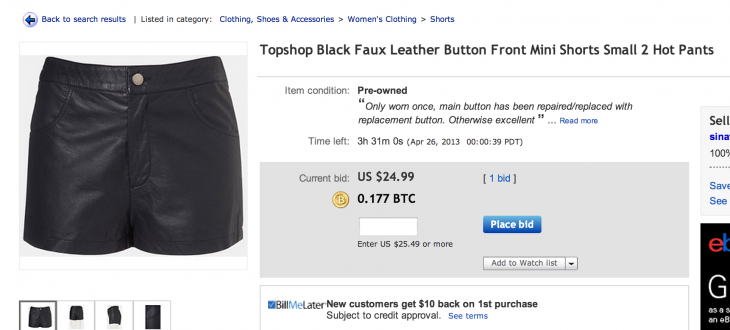We know PayPal is thinking about adding Bitcoin support to its payment service, but if you can’t wait to check the Bitcoin prices on those eBay auctions you’re sniping, website modding serviceBetterInternet has got you covered.
BetterInternet, which debuted at Techono.me last October, acts as a real-time filter for any website, allowing interested parties to develop modifications for their favorite sites. Co-founder Oded Golan said the team built the eBay/Bitcoin mod to get a sense of how volatile the crypto-currency is.
Sadly, the mod doesn’t make it possible to bid with Bitcoins, so I won’t be able to buy these hot pants anonymously just yet.

If you’re looking for a something a little more useful, check out this Flipboard layout version ofTIME Magazine and this Rotten Tomato/IMDB mashup.
First there was ecommerce, a term developed in the early '80s to abbreviate "electronic commerce," or sales made possible through electronic funds transfer (and later, the Internet). Since then, marketers have gleefully affixed various letters to the word "commerce" to describe sales (or the potential for sales) made through different platforms: m-commerce for mobile, f-commerce for Facebook and p-commerce, which I've discovered recently, is an abbreviation for both "participatory commerce" or "Pinterest commerce."
WHAT IS PARTICIPATORY COMMERCE?
A few quick Google searches reveal that the phrase participatory commerce was first coined in 2005 by Mark Pincus, founder and CEO of gaming juggernaut Zynga. It was popularized (to a degree) five years later, when entrepreneurs Daniel Gulati and Vivian Weng used it to describe the model for their new online retailing startup, FashionStake (acquired by Fab.com in January 2012).
Participatory commerce, according to Gulati, is a sales model that allows shoppers to participate in the design, selection or funding of the products they purchase. NIKEiD, for example, lets customers customize the colors and materials of Nike shoes. Online womenswear retailer ModCloth has a "Be the Buyer" program that invites shoppers to vote to determine what designs are sent into full-scale production, similar to a program FashionStake once offered. Users of Kickstarter are able to determine whether a product gets made by contributing to a funding goal. These types of features are frequently grouped under the definition of "social commerce," or s-commerce, as well.
A SECOND MEANING: PINTEREST COMMERCE
When Pinterest's popularity began to skyrocket in mid-2011, retailers were quick to recognize its potential as a sales driver, giving rise to the phrase "Pinterest commerce," which, like participatory commerce, has sometimes been abbreviated to "p-commerce."
Pinterest itself has not yet enabled selling on its site, but retailers continue to run tests to see if they can convert the network's more than 48 million users to customers. Some retailers, including Wayfair, have found that visitors from Pinterest are more likely to make a purchase and to spend more than those referred by other social networks, including Facebook and Twitter.
SHOULD YOU USE "P-COMMERCE"?
No. Not only will you sound like a tool, there's a good chance no one will know what you're talking about.









